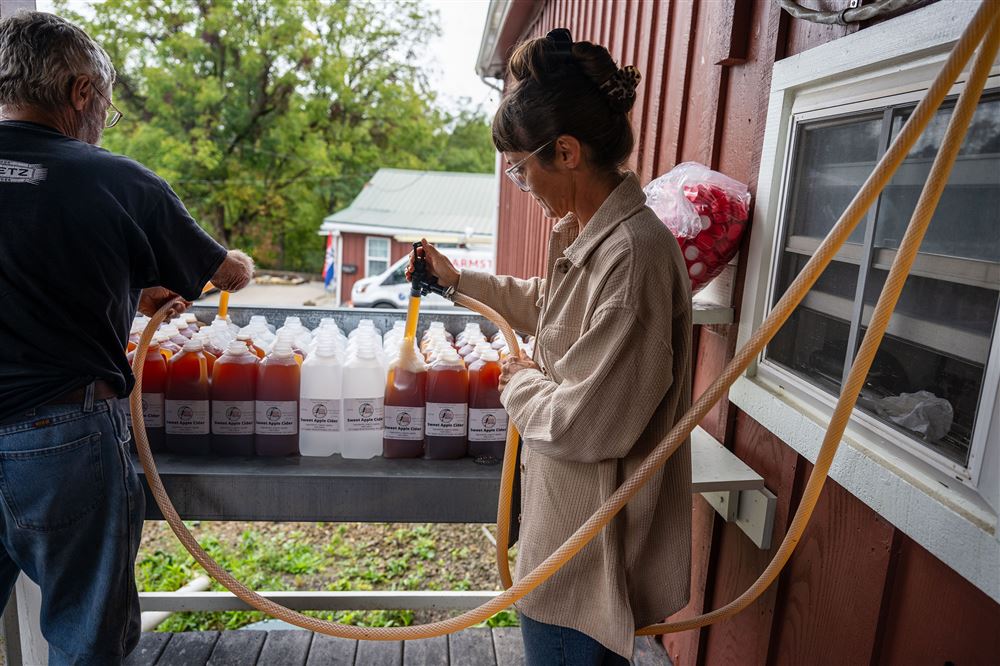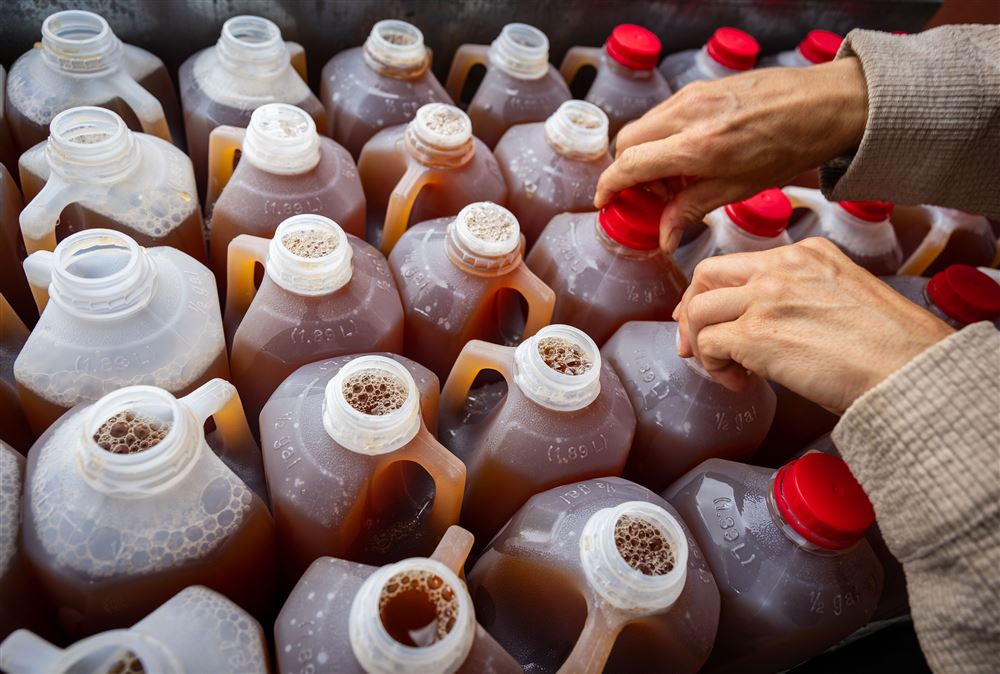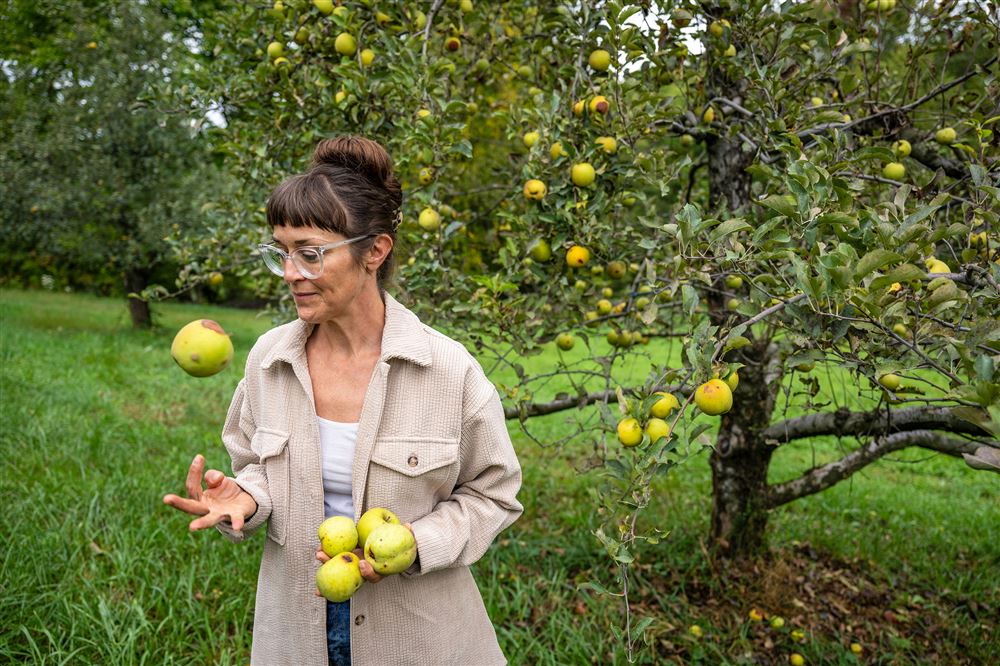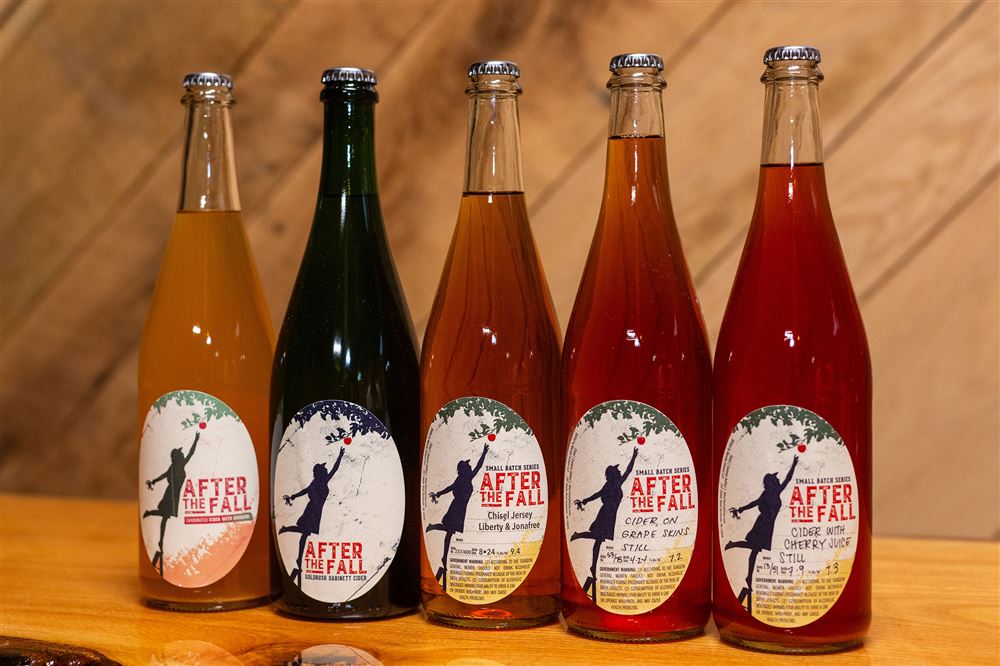An artist's touch turns apples into hard cider, vinegar and sweet rewards
By Gretchen McKay / Pittsburgh Post-Gazette
Like a lot of farm kids, Maria Kretschmann and her sisters were expected to help out on their family’s certified organic fruit and vegetable farm in Beaver County.
Their chores included everything from picking and packing vegetables to making fires for burning trash and taking out the compost on the 80-acre farm in New Sewickley.
“It was a lot of work,” the Wilkinsburg resident remembers with a laugh. “We were never inside.”
No wonder then that by the time she graduated from high school, she had decided farm life just wasn’t her thing.
Art was her passion, and she was lucky to have parents who always encouraged their kids to chase their dreams, even if it would take them off the land they were raised on.
So after graduating from now-closed Quigley Catholic High School in Baden, Kretschmann traded getting mud under her fingernails to dirtying her hands with clay and acrylics at Rochester Institute of Technology, from which she graduated in 2004 with a bachelor’s degree in ceramics and sculpture.
For the next decade, she worked as a studio artist in Philadelphia, specializing in bronze casting and foundry work while supplementing her income with bartending and waitressing gigs. Then her parents, Don and Becky Kretschmann, started talking about retiring, and she had a moment of reckoning.
She loved her work as artist, and had been shown nationally. But was it time to follow in her parents’ agrarian footsteps?
Answering in the affirmative, she returned to Pittsburgh in 2015 to help out on the farm. Hoping to capitalize on the growing popularity of hard cider, she launched After the Fall Cider in 2018, using apples grown there and pressed just down the road at Sally’s Cider Press in Harmony.
“I’m an ambitious person and I just wanted a change,” she explains. “So I came back to see what I wanted to do.”
The Kretschmanns, who began farming organically in 1971 on rented land in Latrobe and Greensburg, bought the first parcel of land on Zeigler Road in 1978. Their farm was among the first and largest in Pennsylvania to be certified organic.
The couple also were pioneers in direct-to-consumer sales when they started offering community-supported agriculture shares to customers in 1993.
Like many farmers, they had hoped to pass the farm onto one of their three children. When that didn’t pan out — their youngest daughter, Grace, teaches in a tribal school in Washington state while oldest daughter, Anne, is an environmental scientist — they searched high and low for nearly a decade for someone, anyone, to take over their agricultural business as a turnkey operation.
For different reasons, nothing worked out and the couple ended up putting the farm in a trust after their final harvest in 2021. (Though, they were able to lease around 5 acres to former employee Todd Wilson, who runs Tiny Seed Farm, a CSA in the North Hills.)
Something about her parents’ decision to try something different after a lifetime of doing the same thing sparked a similar fire in Kretschmann’s belly.
While she was good at managing her dad’s CSA when she boomeranged home, she also wanted something of her own. A lover of hard cider, which pre-COVID 19 was experiencing a boom, she was drawn to her parents’ orchard. Pennsylvania ranks fifth in the nation for the number of commercial producers, with an estimated 80 cider producers.
Her father was an apt mentor on her journey to become an orchardist and cider maker, of course. But she also learned from the network of like-minded fruit growers and cider makers from across the East Coast who every year attend the Holistic Orchard Network round table in western Massachusetts.
Their talk of spray schedules, philosophies on sustainable agriculture and knowledge of apple diseases “sort of inspired me,” she says.
But she didn’t see it as a career. She imagined it as a side hustle to her work as a ceramics artist with the Rivers of Steel Arts program at the historic Carrie Furnaces.
Cider making as a secondary occupation seemed to work, she says, because it was more interesting then fruit and vegetable farming, and also more creative. And it requires tastings and other public events as well as setting up a stand at farmers markets, so “it gets me into the public more, and I’m a very social person.”
But it would take some doing.
Her parents planted their 4-acre apple orchard in the 1980s primarily with table apples like Liberty, Jonafree and Goldrush, which are also good for making fresh sweet cider.
Hard cider requires a more dense and bittersweet apple you’d never find in a grocery store. Kretschmann had to graft new varieties on some of the old, non-producing trees using a technique called “top-working.” The new ones include British cider varieties Dabinett, Chisel Jersey and Tremlett’s Bitter.
“I went to Ithaca [New York] and collected bud wood at a friend’s orchard,” she recalls. And, using the established root system of existing trees that had been cut back to just one or two limbs, she grafted the new varieties on top of them.
Standard apple trees take anywhere from eight to 10 years to produce fruit, but with top-working, the tree grows a whole new top with apples in just two or three years. Over the past eight years, Kretschmann has doubled the size of the orchards, adding another 4 acres of trees for a total of 8 with 40 new varieties of apples.
The process of cider making takes about eight months, start to finish.
After the apples are picked and hauled to Sally’s to be pressed, Kretschmann allows the native yeast that lives on the apple skins to ferment the cider for one to three months in four stainless-steel tanks in the production room where her father used to wash and pack vegetables.
After the cider has been racked to remove the liquid from the sediment, or lees, on the bottom of the tank, it’s fermented a second time for an additional month or two. Then the cider is put into 750-milliliter bottles and allowed to clear naturally.
Certified by the Cider Institute of North America in April 2019, Kretchmann launched the business that fall with two simple ciders made with a blend of apples: a complex and aromatic dry cider made with Goldrush and Dabinett apples, and a more light-bodied, off-dry cider made with a blend of crab apples, heirloom apples and Pristines, an early season apple.
“In the beginning, I was doing a lot of experimenting, just to see what works,” she says.
Tucked into what once served as a hayloft in the farm’s 1860s barn when she was a kid, the cidery’s tasting room — lovingly referred to as a “pandemic project” — opened to the public in 2021.
While she didn’t design the cider’s whimsical label — that’s the work of her artist friend Annalee Lanier — she did build her own counter-pressure bottling line. She also handcrafted the live-edge tables in the cidery’s tasting room from white oaks that were cut down on the property, dried by Amish workers and finished with self-leveling epoxy.
“And I did the metalwork, too,” she says.
While it got off to a good start, business dried up a bit when the pandemic hit and people were no longer going out. It’s still something of a struggle for the cider maker, because she sells direct to the consumer without a middleman and the market isn’t year-round like with craft beer. Sales tend to drop dramatically during the winter months.
“And I didn’t want to be pushy about it,” she quips, adding with a weary smile, “Every cider maker I know has a career.”
Which is why she says it’s important that customers advocate for farmers, especially when they don’t find what they’re looking for in grocery stores.
“You can’t want organic stuff but then deny the source,” she says, “or the source will disappear.”
She offsets the downturn by selling around 500 gallons of homemade cider vinegar each year ($15 for 16 ounces) along with a hot sauce made with the Scotch and habanero peppers she grows in the greenhouse across from the barn, alongside fresh ginger, turmeric, basil and other herbs. (It sells for $8 a bottle at ShadoBeni on the North Side.)
Just like with grapes, apples’ flavor changes from year to year depending on the weather, so each vintage is a little different. What sets After the Fall ciders apart from the competition, Kretschmann says, is that they are more full-bodied and dry than most hard ciders produced in Pittsburgh.
“You don’t have to be a big drinker to enjoy them,” she says.
Today, Kretschmann is producing around 1,500 gallons of cider a year (or roughly 7,000 bottles). Depending on the time of year, it comes in several varietals, including cider made with cherry juice and rhubarb, all of which pack a punch of between 7% and 9.4% alcohol by volume. A 750-ml bottle costs $20 and can be purchased at the Squirrel Hill Farmers Market and through the cidery’s online store at afterthefallcider.com.
In addition, Kretschmann created a cider club that delivers three bottles of small-batch ciders right to your door for $50 (or six bottles for $100) four times a year. You also can purchase it in person at the farm, which will host a free tasting and tour of the orchards from noon-4 p.m. Oct. 12 at 257 Zeigler Road in New Sewickley.
Most will agree farming is extremely hard work, especially when you go organic. Yet bearing witness to the cycles of nature is also happy work, Kretschmann says, because Mother Nature is the “best boss” and the rewards almost always outweigh the labor.
“The farmer might be the last free wo(man) in our corporate oligarchy,” she says, “and I want to live a free life.”




